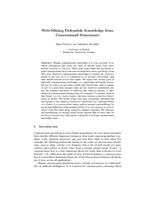Web-Mining Defeasible Knowledge from Concessional Statements
From International Center for Computational Logic
Web-Mining Defeasible Knowledge from Concessional Statements
Alina PetrovaAlina Petrova, Sebastian RudolphSebastian Rudolph
Alina Petrova, Sebastian Rudolph
Web-Mining Defeasible Knowledge from Concessional Statements
In Ollivier Haemmerlé, Gem Stapleton, Catherine Faron Zucker, eds., Proceedings of the 22nd International Conference on Conceptual Structures (ICCS 2016), volume 9717 of LNCS, 191-203, July 2016. Springer
Web-Mining Defeasible Knowledge from Concessional Statements
In Ollivier Haemmerlé, Gem Stapleton, Catherine Faron Zucker, eds., Proceedings of the 22nd International Conference on Conceptual Structures (ICCS 2016), volume 9717 of LNCS, 191-203, July 2016. Springer
- KurzfassungAbstract
Mining common-sense knowledge is a vital problem of artificial intelligence that forms the basis of various tasks, from information retrieval to robotics. There have been numerous initiatives to mine common-sense facts from unstructured data, more specifically, from Web texts. However, common-sense knowledge is typically not explicitly stated in the text, as it is considered to be obvious, self-evident, and thus shared between writer and reader. We argue that certain types of defeasible common-sense knowledge (i.e., knowledge that holds in most but not all cases), in particular, beliefs and stereotypes, tend to appear in text in a particular manner: they are not explicitly manifested, unless the speakers encounter a situation that runs in contrast to their defeasible common-sense assumptions. For example, if a speaker believes that Spain is a very warm country, she may express a surprise when it snows in Bilbao. We further argue that such conceptual contradictions correspond to the linguistic relation of concession (e.g., "although Bilbao is in Spain, it is snowing there today") and we present a methodology for extracting defeasible common-sense beliefs ("it is not common to snow in Spain") from Web data using concessive linguistic markers. We illustrate the methodology by mining beliefs about persons and we show that we are able to extract new information compared to existing common-sense knowledge bases. - Forschungsgruppe:Research Group: Computational LogicComputational Logic
@inproceedings{PR2016,
author = {Alina Petrova and Sebastian Rudolph},
title = {Web-Mining Defeasible Knowledge from Concessional Statements},
editor = {Ollivier Haemmerl{\'{e}} and Gem Stapleton and Catherine Faron
Zucker},
booktitle = {Proceedings of the 22nd International Conference on Conceptual
Structures (ICCS 2016)},
series = {LNCS},
volume = {9717},
publisher = {Springer},
year = {2016},
month = {July},
pages = {191-203}
}
